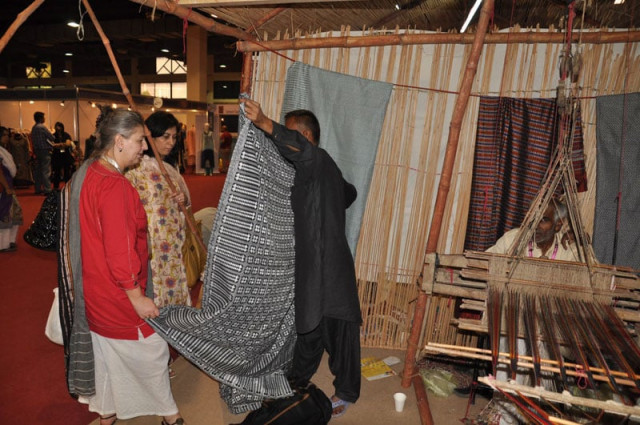Textile manufacturing: At German exhibit, exporters come back empty-handed
Textile lobby wastes no time in blaming govt for their own poor performance.

At a press conference held in Faisalabad on Monday, Rana Arif Tauseef, the chairman of the PTEA and CEO of Rana Textile Mills, was quick to blame the government for the textile industry’s failure to get export orders, citing massive power cuts and a gas rationing plan that the textile industry feels does not provide adequate supplies to their captive power plants, as the main reasons for the poor performance.
Heimtextil is considered particularly important since it is held in the heart of Europe and is the first major textile fair of the year, essentially giving it the position of kicking off the business year in the textile business. It is the largest international fair for home and contract textiles.
“Heimtextil, being a global benchmark for quality design textiles, has great importance for Pakistani textile exporters, as retailers from around the globe visit this fair for new fashion trends and to place their orders,” said Tauseef.
One of the biggest reasons retailers were reluctant to do business with Pakistani exporters was the fact that many had failed to live up to their contract commitments last year, which the PTEA chairman blamed on the energy crisis in the country.
“The severe energy crisis hampered the production process, creating a drastic fall in industrial output and Pakistani exporters were unable to timely honour their export commitments,” he said.
Yet despite their protestations, many players in the textile business say that one of the biggest reasons for the low number of orders may be the recession that is expected to hit the European Union as a result of the sovereign debt crisis on that continent.
Economists around the world are now predicting a drop in retail sales as well as total economic output throughout Europe as a result of the crisis, even in Germany, the continent’s strongest market. Those recessionary fears seem to have impacted the success of the fair itself, which attracted far fewer visitors than it normally does.
“In normal years, as many as 350,000 buyers show up at Heimtextil. This year, there were only 95,000,” said Tahir Rangoonwala, a director at Terry World Textiles, a Karachi-based firm.
Retail sales have been dropping throughout the continent as European consumers bare back their spending and start saving more in anticipation of the economic downturn and government austerity. Eurostat, the European Commission’s statistical service, reports that retail sales have been on a downward trend since at least the middle of 2010.
Yet textile lobbyists continue to blame the government, demanding that gas be allocated to captive power plants in some of the largest textile manufacturing companies, even if it means that the gas is allocated at the expense of power plants that serve the rest of the country.
The PTEA chairman claimed that production had dropped by 45% as a result of the gas shortage in the country.
Exports have been dropping in both October and November of last year, the periods when Eurostat reports that European retail sales dropped by 0.8% and 0.6% respectively. Many industry experts fear that the export targets for December and January will be all but impossible to meet.
Published in The Express Tribune, January 17th, 2012.



















COMMENTS
Comments are moderated and generally will be posted if they are on-topic and not abusive.
For more information, please see our Comments FAQ